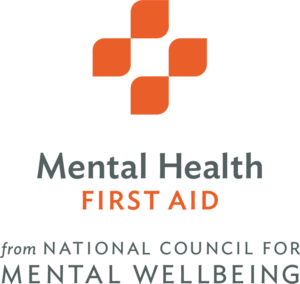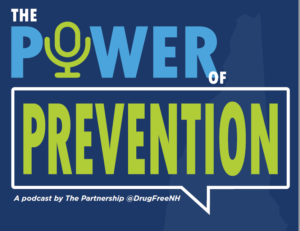In a 2021 study, nearly half of Americans surveyed reported recent symptoms of an anxiety or depressive disorder, and 10% of respondents felt their mental health needs were not being met. Rates of anxiety, depression, and substance use disorder (SUD) continue to increase among all age groups.
Yet, many of us do not understand how to help someone who is experiencing a mental health emergency. Most of us would know how to help if we saw someone experiencing a heart attack—we would start CPR, or at the very least, call 9-1-1. But, we struggle to respond to someone experiencing a panic attack or noticing the signs of SUD in a friend or loved one.
The good news is, we can help with kindness and compassion and knowing the right questions to ask.
About Mental Health First Aid
 Mental Health First Aid (MHFA) is a course that teaches people to identify, understand, and respond to mental health and substance use challenges for youth, adolescents, and adults. MHFA was created in Australia in 2001 by Betty Kitchener, a nurse specializing in health education, and Anthony Jorm, a mental health literacy professor. MHFA takes the fear and hesitation out of starting conversations about mental health and substance use by improving understanding and providing an action plan that teaches people to safely and responsibly identify and address a potential mental illness or SUD.
Mental Health First Aid (MHFA) is a course that teaches people to identify, understand, and respond to mental health and substance use challenges for youth, adolescents, and adults. MHFA was created in Australia in 2001 by Betty Kitchener, a nurse specializing in health education, and Anthony Jorm, a mental health literacy professor. MHFA takes the fear and hesitation out of starting conversations about mental health and substance use by improving understanding and providing an action plan that teaches people to safely and responsibly identify and address a potential mental illness or SUD.
Participate in a Mental Health First Aid Course
If you are interested in attending a MHFA course in New Hampshire, training is available through the UNH Extension and NH’s Community Health Centers. You can also visit the National Council for Mental Wellbeing’s MHFA website.
Hear from a Mental Health First Aid attendee!
The guest post that follows, was written anonymously by someone who recently attended a Youth MHFA course. The author shares how their lessons learned equipped them to successfully help their own daughter who was experiencing serious mental health challenges.
What Mental Health First Aid Has Meant to Me
I’ve been in the field of youth development for 30 years, practicing substance use prevention and mental health promotion for 10 of those. Taking Youth Mental Health First Aid (YMHFA) was so meaningful to me, even after all these years working in the field.
As a parent and as a professional working with youth and the systems that support them, I was deeply moved by YMHFA. In fact – it changed my life. It gave me concrete information on what to be paying attention to and HOW to show care and support to a young person, separating the normal adolescent behavior from worrisome behavior.
The morning after the training, I asked my daughter if she was thinking about killing herself. She said yes.
It was only because of YMHFA that I was able to not only ask her, but ask her in a way that she was able to answer honestly. It was only because of YMHFA that I was able to be present when she answered and feel empowered to handle the situation appropriately. I went from wondering, thinking about it all night long, losing sleep, getting angry, feeling helpless, not knowing what to do to feeling empowered to take care of my child.
The course reduced the fear, reduced the stigma, and provided me with the tools to do something and say something. Just like medical first aid, because of which I know what to do to take care of a wound, respond to a sprain, perform CPR. The information and skills taught in YMHFA can address smaller problems before they become crises. And they can save a life.
I sat with my daughter. She didn’t want to talk much. So I sat with her. We cried. I held her. I told her it was going to be okay. She didn’t have a plan or a method, so we didn’t go to the hospital. We stayed close and we learned how to share when she was feeling unsafe without my prying too much. She developed a safety plan. And today – she is thriving. Most of the time. And sharing when she is not.
I feel so passionately about this course that I immediately signed up to be a trainer. If we can all be Mental Health First Aiders, think about the support our youth might feel. Given that 25% of the respondents to the 2021 NH YRBS said they had seriously considered suicide, 45% of the respondents said they never or rarely get the help they need when they feel sad, empty, hopeless, angry, or anxious, and that 33% of the respondents never/ rarely have felt that they could talk to a caring adult in their life about their feelings, it is clear that we adults need to learn these skills to support our youth. And we need to use them. Lives depend on it.
Power of Prevention Podcast Episode: Mental Health First Aid - A Bridge to Care, Comfort, and Treatment
 In a recent episode of our Power of Prevention podcast, The Partnership @drugfreeNH talks with guest Suzanne Weete from Community Partners NH about Mental Health First Aid.
In a recent episode of our Power of Prevention podcast, The Partnership @drugfreeNH talks with guest Suzanne Weete from Community Partners NH about Mental Health First Aid.

